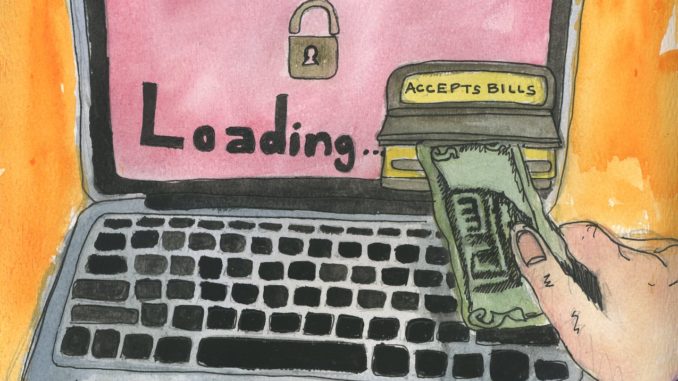
By Audrey Barrett
Imagine this: it’s 11:47 p.m. and you desperately need to submit a paper by midnight. And then your stressed out finals brain can’t remember if Dutch people are from Holland or the Netherlands. Or is it Denmark? So you do a quick Google search to figure it out, but it seems every link you click on is blocked and invites you to pay to access this site. By 11:53 p.m., you’ve figured out that Holland and the Netherlands are, in fact, the same, and go to submit the paper. Then, out of nowhere, Moodle gives you the spinning beachball of doom. 11:57 p.m.: still loading. You click refresh a thousand times and pray to the Internet gods that this paper gets in on time, since you can’t really afford to pay for faster service. 12:04 a.m.: ready to take the “L” on this one, beyond frustrated, you accidentally scream and punch your iMac and wake up your roommate and suddenly your entire life is in shambles because you can’t even get on Twitter to complain about it!
And that, fellow college students, is why we need net neutrality.
In all seriousness, net neutrality protects the Internet from becoming an elite platform that benefits corporations. It also gives a space for minorities, underrepresented voices and small businesses to express their opinions and exert influence in society. According to Wikipedia (which I can access because the Internet is for now a free and equal democracy), “Net neutrality is the principle that Internet service providers must treat all data on the Internet the same, and not discriminate or charge differently by user, content, website, platform, application, type of attached equipment or method of communication.” Without this, providers like AT&T, Comcast and Verizon could “intentionally block, slow down or charge money for specific websites and online content.” Meaning, if Comcast and Netflix get in a petty fight, you won’t be able to watch the next episode of “Stranger Things” if you have Comcast.
The Federal Communications Commision (FCC) will vote on Dec. 14 to repeal the existing net neutrality rules determined under the Obama administration, which classify Internet Service Providers as common carriers under Title II of the Communications Act. If the repeal passes, media oligarchs will be able to control the Internet and the Trump administration will be able to suppress citizen dissent. Sounds like Communist China to me; undoubtedly the government is in cahoots with the big telecommunications conglomerates and essentially will get to decide what I look at and say online.
Already, popular opinion is being ignored. Trump’s FCC chairman Ajit Pai (a former lawyer for Verizon) introduced the anti-net neutrality proposal earlier this year, and citizen comments on the FCC site overwhelmingly oppose the proposal; Ars Technica reported in August that 98.5 percent of comments oppose Pai’s plan. It is uncertain whether citizen resistance can stop the government from terminating our freedom of speech online. And according to the Washington Post, some comments supporting Pai’s plan were, ironically, fraudulent, impersonating American citizens without their consent. Talk about fake news.
“Chairman Pai will hand the keys to our open internet to major corporations to charge more for a tiered system where wealthy and powerful websites can pay to have their content delivered faster to consumers,” Congressional Progressive Caucus co-chairs Mark Pocan of Wisconsin and Raúl Grijalva of Arizona said in a statement released on Nov. 21. “This leaves smaller, independent websites with slower load times and consumers with obstructed access to the internet — a particularly harmful decision for communities of color, students and online activists. This is an assault on the freedom of speech and therefore our democracy.”
As students, and as citizens who don’t want Big Brother looking over our shoulder, we need net neutrality to protect the Internet and all it does for us. I encourage you to get involved and let the policymakers know how you feel.
To preserve net neutrality, here are some of the men that need to change their vote:Michael O’Rielly (mike.orielly@fcc.gov), Brendan Carr (brendan.carr@fcc.gov) and Ajit Pai (ajit.pai@fcc.gov).
Subscribe to the Mossy Log Newsletter
Stay up to date with the goings-on at Lewis & Clark! Get the top stories or your favorite section delivered to your inbox whenever we release a new issue.

Leave a Reply